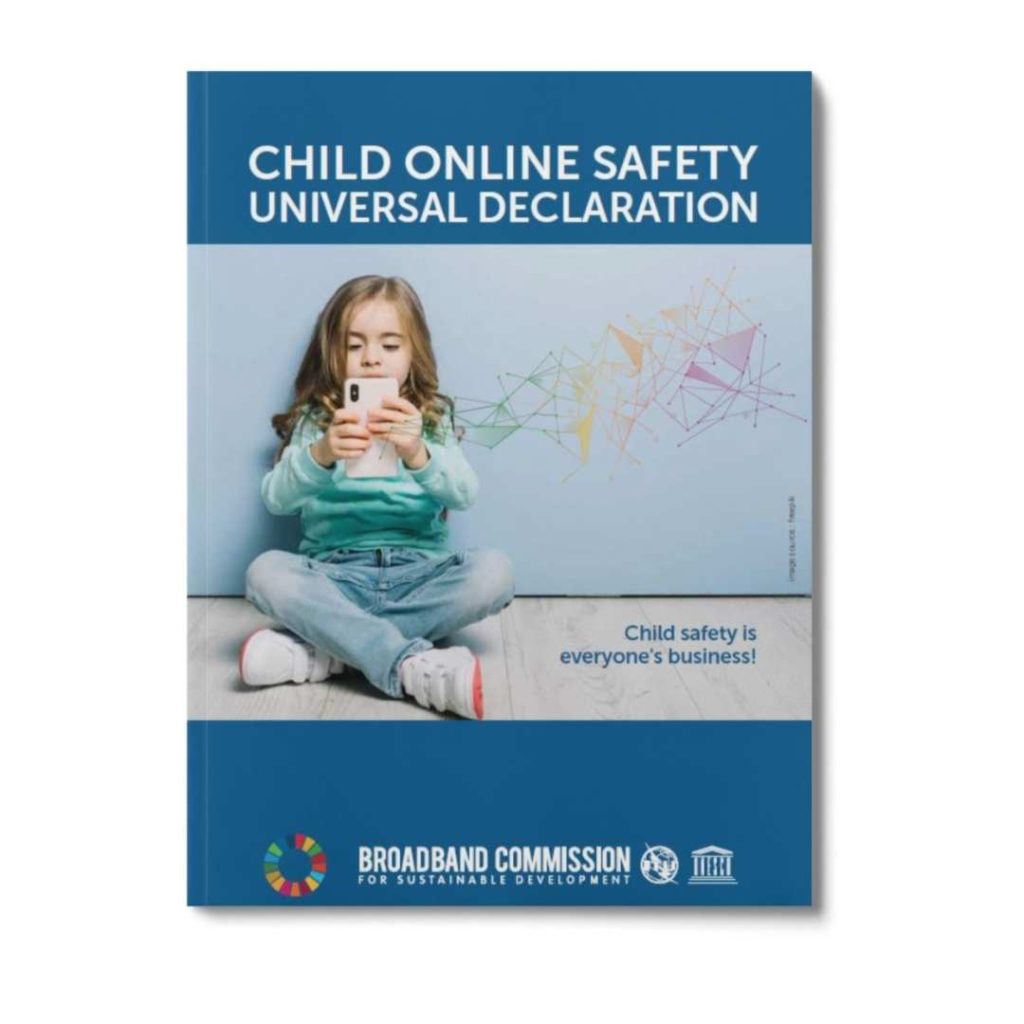What risks and harms do children face online and what can we do to protect them?
The core objective of the Broadband Commission Working Group on Child Online Safety was to raise awareness of the online risks and threats to children. Co-Chaired by Dr. Joanna Rubinstein, of the World Childhood Foundation, and Zain Group, the Working Group on Child Online Safety has created a report that brings together the available evidence on the scale and nature of the risks and harms children face online, and provides actionable recommendations to minimize risks and threats, while simultaneously being able to capitalize on the benefits the expansion of broadband will bring to children, particularly those in developing countries.
Setting the Stage
An Increasingly Relevant Issue
Often, in digitized territories, educational and law enforcement infrastructures will have difficulty keeping up with sophisticated and determined criminals misusing digital platforms and services. As children become increasingly engaged with the digital world, making a unified global approach to combat all forms of online child maltreatment is more important and more urgent than ever.
Children face a range of harms and risks online, from poorly designed services that entrap them (intentionally or not) in age-inappropriate contracts, through cyberbullying and exposure to unsuitable content, right through to severe harassment, online grooming, radicalization, and sexual exploitation and abuse. It is the job of the adult world to find a way to mitigate and prevent these harms and risks.
- All stakeholders, spanning from governments, law enforcement, the private sector, and experts, must recognize that new and more effective tools that can be shared, are platform agnostic, open source, and/or open access are needed to address these risks.
The Way Forward
Conclusions and Recommendations
Stakeholders groups identified by the Working Group on Child Online must work together to address SDG 16.2 and increase child safety online. Without collaboration, initiatives to promote child online safety will not realize their full potential.

Drawing on the findings of the latest research, Working Group’s 2019 report, titled Child Online Safety: Minimizing the Risk of Violence, Abuse, and Exploitation Online outlines the broad range of risks that children face online. It provides a sense of the scale and nature of those risks and recommends concrete and actionable steps that various actors can take to minimize the risks, threats, and harms, and to make children safer online.
The goal of the recommendations of this report is to provide a framework that supports collaboration and action among the stakeholders who play an integral role in prioritizing child online safety.
Download the report to read the complete list of recommendations.
The Broadband Commission Working Groups recommends that all individuals who consider themselves champions for children’s rights in the digital space join our collective action by signing the Child Online Safety Universal Declaration to:
Include child online safety strategies in all national broadband and/or digital plans by 2021
Prevent, detect, respond, and take action
Establish clear and accountable mechanisms to ensure child rights are included in operating model
Harmonize definitions and terminology and develop common standards
Use age-appropriate design and meaningful data-consent for social media and gaming platforms, and others online services for children
Invest in data collection and research and in the development and scaling up of technology-driven solutions
Develop common metrics for child online safety
Implement universal digital skills education
The Working Group Model
Composition and Activities

Dr. Joanna Rubenstein
World Childhood Foundation
 Zain Group
Zain Group
Co-Chairs: Dr. Joanna Rubenstein and Mr. Scott Gegenheimer
- Dato Lee Yee Cheong, ISTIC
- Baroness Beeban Kidron, 5Rights
- Mr Börje Ekholm, Ericsson
- Marcin Cichy, Poland
- Mr Denis O’Brien, Digicel
- Speranza Ndege, Kenyatta University
- Dr Carlos Jarque, America Movil
- Ms Audrey Azoulay, UNESCO
- Mr Kevin Martin, Facebook
- Adrian Lovett, Web Foundation
- Mr Mats Granryd, GSMA
- Mr Paul Mitchell, Microsoft
- Ms Phumzile Mlambo-Nguka
- ITU
- E. Mr Hamad Obaid Al Mansoori, TRA
- E. Dr Amni Abou Zeid, African Union
- Ms Kristalina Georgieva, World Bank
- Mr Sunil Bharti Mittal, Airtel
- Huawei
- E. Dr Abdulaziz Salem Al Ruwais, CITC
- Bocar Ba
- Uri Sadeh, Interpol
- Howard Taylor, End Violence Partnership
- John Carr
- Paul Shapiro, ICMEC
- Susie Hargreaves, WPGA, IWF
- RobbertVan Der Berg, ECPAT
- Anna Borgstrom, NetClean
- WEF –YuhyunPark
- Ms. Heddy Ring, Telia
- UNSG High Level Panel on Digital Cooperation
- Julie Cordua, Thorn
- Charlotte Petri Gornitzka, Ms. Jasmine Byrne, UNICEF
- Elizabeth Letourneau, JHU
- Ernesto Caffo
- Helen Mason, Child helpline International
- Samantha Woolfe, INHOPE
Focus Area
Outcome Documents
Co-Chairs
Dr. Joanna Rubenstein
World Childhood Foundation
&
Zain Group
Broadband Advocacy Targets
SDGs








